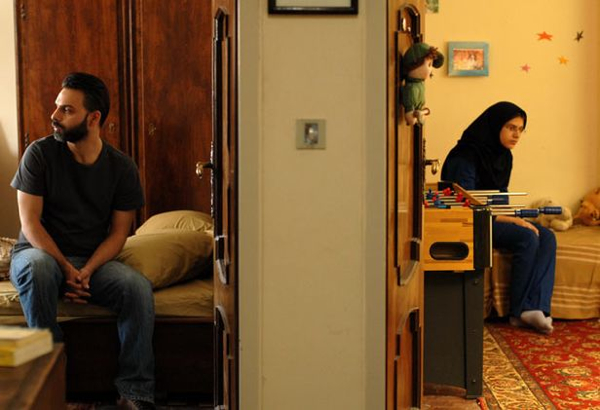Movie review by Greg Carlson
Riveting, humane, and vibrantly alive with closely observed detail, Asghar Farhadi’s “A Separation” showcases dimensions of contemporary Iran that few Americans could imagine while at the same time remaining steadfastly universal. Tumbling headlong through a series of increasingly contentious legal dilemmas, Farhadi’s restless, urgent storytelling – captured in crowded frames by cinematographer Mahmoud Kalari – bounces between domestic and municipal locations as a painful and complex examination of marriage, parenthood, caregiving, class, gender, and adolescence consolidates into the kind of masterful cinematic storytelling crafted by the great Italian neorealist filmmakers of the 1940s.
The first Iranian motion picture to win the Academy Award for Best Foreign Language Film and the Golden Bear for Best Film at the Berlin International Film Festival, “A Separation” deposits the viewer in the middle of a searing standoff between middle class Tehran spouses Nader (Peyman Moaadi) and Simin (Leila Hatami), at odds over Simin’s desire to move the family out of the country to provide better opportunities for their child Termeh (Sarina Farhadi, the filmmaker’s daughter). Nader refuses to leave his aging father, whose struggle with Alzheimer’s disease makes constant supervision a necessity, and the bitter standoff only signals more rough times ahead.
Simin moves in with her parents, and Nader hires the pregnant Razieh (Sareh Bayat), who illegally hides the employment from her husband Hodjat (Shahab Hosseini), as a housekeeper and caretaker. Misunderstandings and poor choices lead to tragic results, and Nader and Razieh find themselves entangled in an escalating series of accusations that place their loved ones under tremendous stress. Farhadi filters a great deal of the film’s point of view through the perspective of Termeh, whose childhood disappears bit by bit every time she is called upon to make grown-up decisions.
Delivered with the precision plotting of a procedural, “A Separation” unveils an agenda less concerned with uncovering a single truth than with recognizing the shades of gray that complicate strict interpretations of the law. As we watch Simin struggle with the obstinate, unmovable Nader, Farhadi observes parallel husband/wife discord between Razieh and Hodjat, whose own young daughter provides an additional visual echo between the two families. While the class divide between the sets of couples implies different types and sources of friction, Farhadi constructs a unified, parallel study of gender-dependent predicaments.
“A Separation” resists black-and-white reductionism, and Farhadi’s shrewd objectivity makes room for disparate readings. More conservative viewers, and one presumes some of the Iranian power brokers who originally endorsed the movie’s Oscar candidacy, might readily identify the film’s wrenching events as a blistering critique of divorce. Others will certainly see the story as a reminder that restrictive conditions for women exacerbate problems in a church-and-state linked society. Brilliantly, Farhadi retains all the familiar, recognizable messiness of life without overtly passing judgment on the individuals who populate his movie. This ambiguity, reminiscent of Yimou Zhang’s 1990s work with Li Gong (another instance in which tension between artist and regime was publicized in the West), has made for interesting news items in the wake of Farhadi’s awards season successes: Ethan Sacks reported in the “New York Daily News” on March 12, 2012 that Iranian government officials had canceled a planned celebration of “A Separation.”
